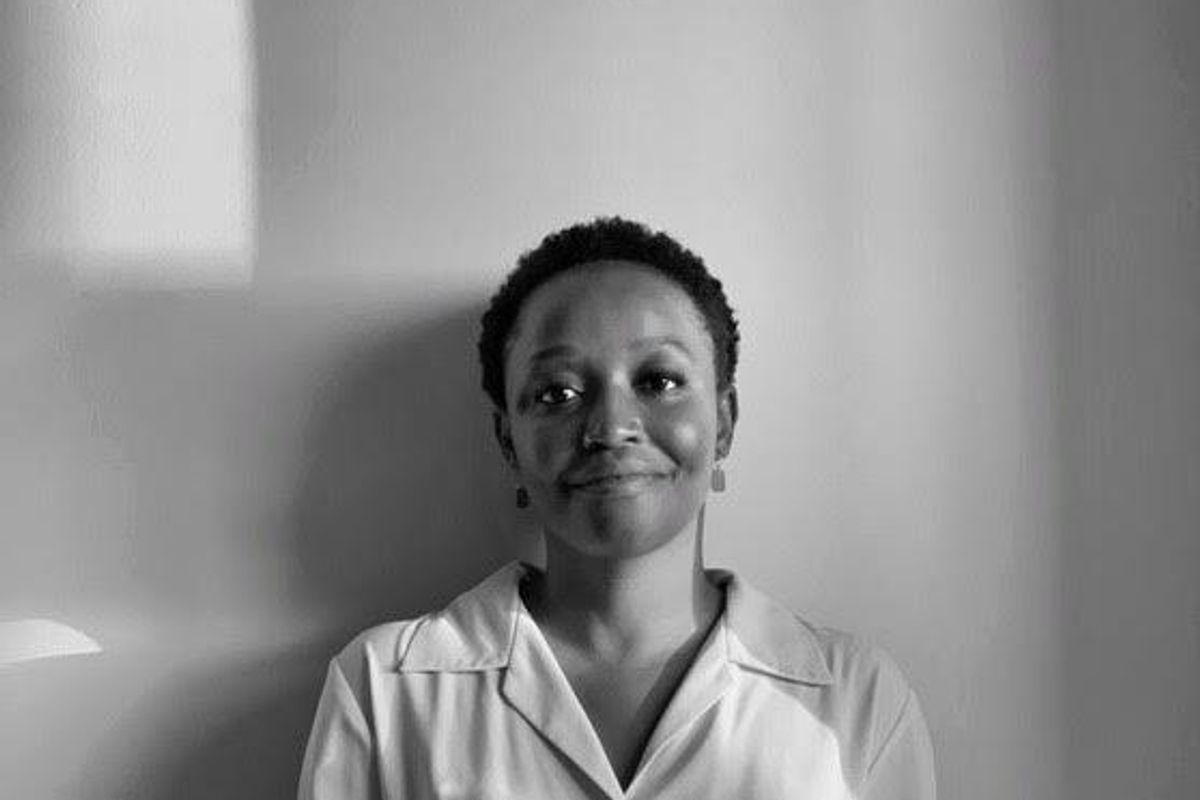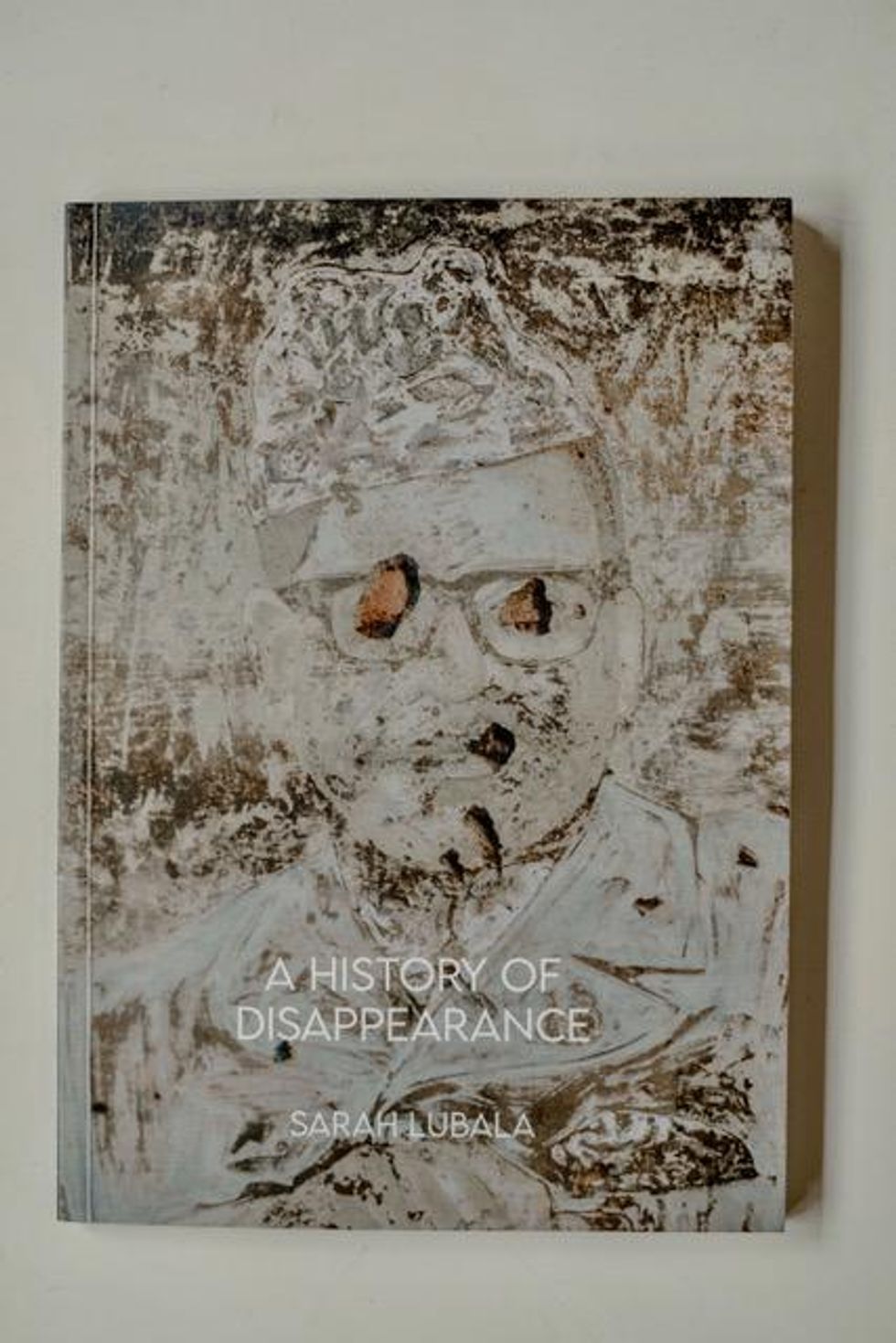Poet Sarah Lubala Examines Disappearances of All Kinds
The DRC-born poet tells OkayAfrica how and why she practices 'a poetics of disobedience.'

Poet Sarah Lubala examines the experiences women face that make them ‘disappear.’
Sarah Lubala has been interrogating the history of disappearances. And no, she’s not with the FBI or DCI, but with the POETRY department. ‘I arrived with/ bruised knees/ wet hair/ a mouth-full of salted fish,' -- she recreates the scene in '6 Errant Thoughts on Being a Refugee,' the first poem in her debut poetry collection, A History of Disappearance.
This poem reveals Lubala is an authority on the subject. She doesn’t write about what she’s heard or read, but from lived experience. Two decades ago, her family fled the Democratic Republic of Congo amidst political unrest as militant factions tried to overthrow the dictator Mobutu Sese Seko. From Congo, she stayed in South Africa, Ivory Coast, and then lived again between South Africa, Holland, and China for a few years. ‘I was raised on the Congolese-gospel/ I can teach you how to forget/ where you are from,’ she writes.
Her poetry collection weaves together different forms of disappearances. “Death, abandonment, displacement, disavowal, much of these histories are marked by disappearances of all kinds,” she tells OkayAfrica. “I wanted to write about disappearance as a structure of experience, and not only as an event.”
Lubala says she writes about disappearances to make the loss intelligible. Her poem 'What To Say To The Immigration Officer When He Asks You Where You Are From,' won the International Poetry Competition Castello Di Duino XIV Edition. She’s also been twice shortlisted for the Gerald Kraak Award, which recognizes the finest creative works of Africans dealing with topics of gender, social justice, and sexuality for her poems, '6 Errant Thoughts on Being a Refugee' and 'A List of Things I Do Not Tell My Mother.'
Today, Lubala from Lubumbashi has established herself as an award-winning poet and writer based in Johannesburg. Her works have been published in the Mail & Guardian, The Daily Vox, Brittle Paper, Apogee Journal, amongst others. “At the moment, I’m trying to rearrange my life in ways that better nurture my creativity. It’s hard because poetry is one of the least popular forms of literature in the book market, but I firmly believe it has so much to offer,” she says.
OkayAfrica talked to Lubala about the subject of disappearances; past, present and future.Interview has been edited for length and clarity.
Having experienced forced migration before, has watching Ukrainians fleeing their country because of the Russian invasion affected you?
Absolutely. I think anyone who has experienced forced or voluntary exodus understands the particular pain of the dispossessed, and in some ways that pain never leaves you. I think most people are empathetic. They watch what’s happening in Ukraine or the immigrants fleeing conflicts in the Central African Republic or Syria, and they try to understand what it’s like for people who flee their homes. But until you understand concepts like country, citizenship and nationality are not immutable, that you can have a place in the world one moment, and have it snatched from you the next, you can’t fully comprehend that trauma. My hope in writing poetry is to get readers as close to that experience as possible and, in doing so, expand their moral imagination. We all share an unassailable mutuality. We need to understand that our fates are not separate, but tied up with that of all other nations.
You have now settled in Johannesburg. Do you feel that you finally belong to and have been claimed by Johannesburg?
I don’t think I’ll ever feel like I belong to any one place. What do you do if you feel you belong somewhere, but that place rejects you? That has been my experience living in Johannesburg. The xenophobic attacks make it difficult to feel a secure sense of belonging. I’ve had to think more creatively about my conception of home. Today, home is less a place than a practice. I think of belonging as a spiritual exercise in coming home to myself.
Moving through the world as a Black female immigrant means confronting several violences, whether its gender-based violence or xenophobia, and the only way I know to survive it is by nurturing myself. Coming home to myself involves an acceptance of my complexity and strangeness. It involves vulnerability, and a curiosity about the parts of myself that are still unknown to me. I have to get up close and personal with the things that are uncomfortable and loving myself through them. It’s about tending to my inner life and mothering myself into wholeness against a world that often brutalizes those who live at its margins. And the result of being at home in and at peace with myself and my vulnerability is a growing compassion for myself. This becomes the basis of spiritual growth.

Sarah Lubala hopes readers of her poetry collection, A History of Disappearance, will find their hearts enlarged by the book.
Photo: Sarah Lubala
In the poem 'A List of Things I Do Not Tell My Mother,' you write; ‘I think now I am a woman because I am terrified of my own body and what it makes men do.’ That is a line nearly every woman understands. How have you been able to navigate this?
It’s incredibly difficult. Especially in South Africa, where gender-based violence is an epidemic. For many women, the threat of sexual violence haunts our lives. Pumla Gqola, a South African academic, calls it ‘the fear factory.’ I don’t know that I navigate it as much as I survive it, and I survive it by writing about it. The female ‘fear factory’ functions through shame and control. Poetry is about freedom of articulation and affirming the truth of our experiences. I think of my writing as joining a long line of women’s resistance poetry that exposes the social and political conditions of women’s existences.
In the book, you write about your experience with mental illness. Why has it been important to you to share about this subject that is largely hushed in Africa?
Growing up, my mom used to say: there’s no depression in The Village ™. The proverb clarifies that there is no frame of reference for mental illness in large parts of Africa. People who struggle with mental illness are bewitched or simply not praying enough. The cruel irony is that many of us are still trying to recover from intergenerational trauma that stretches as far back as the first violent European intrusion on the continent. We deserve more than this legacy of grief. I believe that any conversation about reparations and decolonization must include mental health.
You’ve said before that “I practice a poetics of disobedience”, what does this mean?
I love poetry not only because it produces new and alternative knowledge but also because it disrupts the established and already legitimated. My work prioritizes decolonial feminist thinking. I have tried to place gender, race and the experience of the marginalized at the heart of the anticolonial struggle.
What would you want someone reading A History of Disappearance to take away from the book?
Poetry is an education of the heart. I hope the book will grow the reader’s empathy and stretch it beyond their imagining so that it includes everyone, every ‘other’. I hope readers will find their hearts enlarged by the book.
It’s Women’s History Month, which African woman inspires you?
I’m a big fan of Ugandan climate justice activist, Vanessa Nakate. She launched a one-woman protest against climate change in early 2019. For several months she was the lone protester outside of the gates of Ugandan Parliament. She has helped draw attention to the plight of the Congolese rainforests and has called for greater climate equity for Africans. We live on a burning planet, and the countries least responsible for its causes will suffer the most, but the thought of young African female activists like Vanessa demanding climate justice for the continent gives me hope.
- 19-Year-Old South African Slam Poet Lee Mokobe Delivers A ... ›
- These 7 African Women Poets Will Keep You Calm, Cool, and ... ›
- "Give Me Black And African Poets," An Interview With Cameroonian ... ›
- The 10 Best African Poems of All Time - Okayplayer ›

